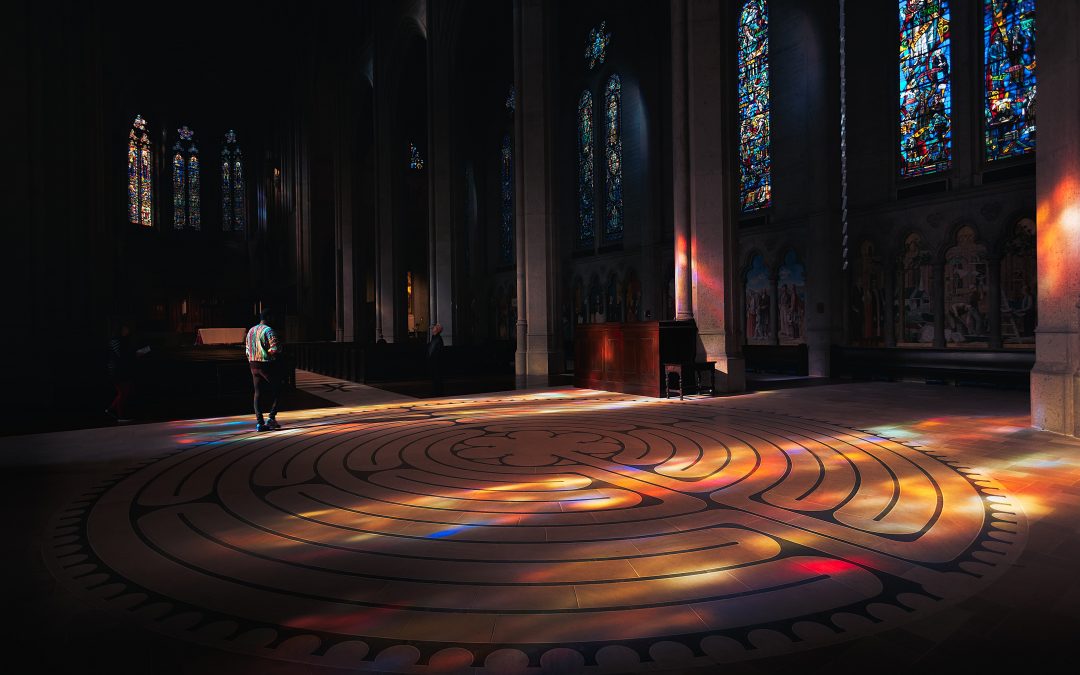The teaching that Christ has one Church is integral to a right understanding of the Person of Christ. Christ must have one Bride only. Moreover, His body must not be divided, fragmented, or depreciated in any way which would imply multiple faiths, Spirits, etc (cf. Eph. 4). It must also be said that this one body and Bride is not an earthly, visible institution, but an invisible, presently inaugurated reality received by faith in the present, to be seen with glorified eyes in the eschaton. Or, to put it positively, the one Bride of Christ presently instantiates, or becomes visible, only in local assemblies or churches.
Yet, the one Church of Christ comprises the whole of the elect people of God at all times and in all places. To deny the one Church of Christ comprised of all the elect, at all times and in all places, without qualification, is to deny Christ a monogamous betrothal to a single Bride, to affirm His body is still broken (Gen. 2:24; Matt. 19:5; Mk. 10:8; 1 Cor. 6:16), and to deny the definite or limited atonement, contra Ephesians 5:25-27.
Below, it will be proved that Baptist history testifies to this common conviction. And while we Baptists have historically put much more practical emphasis on the local church, the unquestionable commitment to a single Bride of Christ may be clearly seen in the documentation below. Many of the document titles double as links to digital versions of source documentation. What is not linked is still sourced underneath the quotation. This symbol (*) corresponds to important commentary or clarifying subject-matter also viewable underneath the relevant quotations.
That Baptists Have Always Affirmed One (catholic) Church, Body, and Bride, We Affirm by the Following Proofs—
Balthasar Hubmaier (1480-1528):
The church is sometimes understood to include all the people who are gathered and united in one God, one Lord, one faith, and one baptism, and have confessed this faith with their mouths, wherever they may be on earth. This, then, is the universal Christian corporeal church and fellowship of the saints, assembled only in the Spirit of God, as we confess in the ninth article of our creed (Nicaea). At other times the church is understood to mean each separate and outward meeting assembly or parish membership that is under one shepherd or bishop and assembles bodily for instruction, for baptism and the Lord’s Supper.
Balthasar Hubmaier, Balthasar Hubmaier, (Scottdale: Herald Press, 1989), 351-352.
The Schleitheim Confession (1527):
The ban shall be employed with all those who have given themselves to the Lord, to walk in His commandments, and with all those who are baptized into the one body of Christ and who are called brethren or sisters…
In the breaking of bread we are of one mind and are agreed [as follows]; All those who wish to break one bread in remembrance of the broken body of Christ, and all who wish to drink of one drink as a remembrance of the shed blood of Christ, shall be united beforehand by baptism in one body of Christ which is the church of God and whose Head is Christ.
Whoever has not been called by one God to one faith, to one baptism, to one Spirit, to one body, with all the children of God’s church, cannot be made [into] one bread with them, as indeed must be done if one is truly to break bread according to the command of Christ.
Hubmaier, Balthasar; Denk, Hans; Simons, Menno. The Anabaptists: Excerpts from the writings of various authors (Anabaptist Writings Book 2) . Solid Christian Books. Kindle Edition.
The Writings of Menno Simons (1496-1561):
But we teach and maintain by the word of the Lord that all true believers are members of one body, are baptized by one Spirit into one body (I Cor. 10:18) and have one Lord and one God (Eph. 4: 5,6).
All who are born of God, are partakers of the Spirit of the Lord, and are called into one body of love, according to the Scriptures, are ready by such love to serve their neighbors, not only with money and goods, but also, according to the example of their Lord and Head, Jesus Christ, in an evangelical manner, with life and blood.
Hubmaier, Balthasar; Denk, Hans; Simons, Menno. The Anabaptists: Excerpts from the writings of various authors (Anabaptist Writings Book 2) . Solid Christian Books. Kindle Edition.
The Dordrecht Confession of Faith (1632):
VIII. We believe in, and confess a visible church of God, namely, those who, as has been said before, truly repent and believe, and are rightly baptized;* who are one with God in heaven, and rightly incorporated into the communion of the saints here on earth. These we confess to be the chosen generation, the royal priesthood, the holy nation, who are declared to be the bride and wife of Christ, yea, children and heirs of everlasting life, a tent, tabernacle, and habitation of God in the Spirit, built upon the foundation of the apostles and prophets, of which Jesus Christ Himself is declared to be the cornerstone (upon which His church is built). This church of the living God, which He has acquired, purchased, and redeemed with His own precious blood; with which, according to His promise, He will be and remain always, even unto the end of the world, for consolation and protection, yea, will dwell and walk among them, and preserve them, so that no floods or tempests, nay, not even the gates of hell, shall move or prevail against them-this church, we say, may be known by their Scriptural faith, doctrine, love, and godly conversation, as, also, by the fruitful observance, practice, and maintenance of the true ordinances of Christ, which He so highly enjoined upon His disciples.* I Cor. 12; I Pet. 2.9; John 3.29; Rev. 19.7; Titus 3:6, 7; Eph. 2:19-21; Matt. 16.18; I Pet. 1.18, 19; Matt. 28.20; II Cor. 6:16; Matt. 7:25.
*This represents an error in Anabaptist thought which was rejected by later Baptists in that the one church of Christ is not visible, but invisible, cf. 2LBCF, 26.
*Some may want to argue the local church is assumed throughout the Dordrecht Confession. However, this is unlikely since, in the article above, “the church” under consideration will never be prevailed upon by anything, including the gates of hell—which no doubt occurs from time to time with regard to local churches. Yet, the one Bride of Christ is preserved in all ages.
A True Confession (1596):
XVII. That in the meantime, besides his absolute rule in the world, Christ hath here in earth a spiritual Kingdom and canonical regiment in his Church ouer his servants, which Church he hath purchased and redeemed to himself, as a peculiar inheritance (notwithstanding manie hypocrites do for the tyme lurk emongest the) calling and winning them by the power of his word vnto the faith, separating them from amongst unbelievers, from idolatrie, false worship, superstition, vanitie, dissolute lyfe, & works of darkness, &c; making them a royal Priesthood, an holy Nation, a people set at liberty to shew forth the virtues of him that hath called them out of darkness into his marvelous light, gathering and writing them together as members of one body in his faith, loue and holy order, vnto all general and mutual duties, einstructing & governing them by such officers and lawes as hee hath prescribed in his word; by which Officers and lawes hee governeth his Church, and by none other.
A Short Confession of Faith (1610)
22. Such faithful, righteous people, scattered in several parts of the world, being the true congregations of God, or the Church of Christ, whom he saved, and for whom he gave himself, that he might sanctify them, ye whom he bath cleansed by the washing of water in the word of life: of all such is Jesus the Head, the Shepherd, the Leader, the Lord, the King, and Master. Now although among these there may be mingled a company of seeming holy ones, or hypocrites; yet, nevertheless, they are and remain only the righteous, true members of the body of Christ, according to the spirit and the truth, the heirs of the promises, truly saved from the hypocrites the dissemblers.*
*Here the one Church of Christ is put for “congregations… scattered in several parts of the world.”
Propositions and Conclusions Concerning True Christian Religion (1612-1614):
65. That the visible church is a mystical figure outwardly of the true, spiritual invisible church, which consisteth of the spirits of just and perfect men only, that is of the regenerate (Rev. i. 20, compared with Rev. xxi. 2, 23, 27).*
*This is a document prepared by English Baptists living in Amsterdam. It represents a positive development from some of the Anabaptist documents in that it carefully distinguishes between the visible and invisible church, a distinction made in the Scripture itself, cf. Eph. 5:25-27; Heb. 12 with Rev. 1-3.
John Spilsbury (1593-1668):
And lastly, I do believe that there is an holy and blessed communion of Saints, that God of his grace calls such as belong to life by election, unto the fellowship of his Son by the Gospel, of which matter, God by his word and Spirit joins them together in his Covenant of grace, and so constitutes his Church…
The First London Baptist Confession (1644/46):
That Christ has here on earth a spiritual Kingdom, which is the Church, which He has purchased and redeemed to Himself, as a particular inheritance: which Church, as it is visible to us, is a company of visible saints, called and separated from the world, by the Word and the Spirit of God, to the visible profession of the faith of the Gospel, being baptized into the faith, and joined to the Lord, and each other, by mutual agreement, in the practical enjoyment of the ordinances, commanded by Christ their head and King.
The Faith and Practice of Thirty Congregations Gathered Together According to the Primitive Pattern (1651):
58. That it is the good pleasure of God, which hath given gifts of his grace to the Saints or Church of God,* that some of the gifted men should be appointed, or set apart to attend upon the preaching of the word, for the further edifying of the Churches, that they may be enabled to stand against all oppositions according as necessity requires, to the glory of God and their comfort. Eph. 4. II, 21.
*The “Church of God” is here put for all the Saints. They then utilize the plural “churches” which strongly implies an invisible church comprised of all saints which instantiates in several local churches.
The True Gospel-Faith (1654):
That all ought to avoid the hearing of any Teachers so as to learn of them, except believers dipped, and making of marriages with any out of the Church lest they be drawn from the truth. 2 Jno.10 v.; I John 4.6; I Cor.7.39; Deut.7.3,4; 2 Cor.6.14,15.*
*The use of “church” in this context must be generally or universally applied since it is extremely unlikely marriages would have been limited only to within local congregations at this time.
Midland Confession of Faith (1655):
9th. That Christ is the only true King, Priest, and Prophet of the Church. Acts ii.22-23; Hebrews iv.14, etc; viii.1, etc.
15th. That persons so baptized ought, by free consent, to walk together, as God shall give opportunity in distinct churches, or assemblies of Zion, continuing in the Apostles’ doctrine and fellowship, breaking of bread and prayers, as fellow-men caring for one another, according to the will of God. All these ordinances of Christ are enjoined in His Church, being to be observed till his Second Coming, which we all ought diligently to wait for.
Somerset Confession of Faith (1656):
THAT this man Christ Jesus suffered death under Pilate, at the request of the Jews (Luke 23:24.), bearing the sins of his people on his own body on the cross (I Pet. 2:24), according to the will of God (Isa. 53:6), being made sin for us, (2 Cor. 5:11) and so was also made a curse for us (Gal. 3:13, 14; I Pet. 3:18.), that we might be made the righteousness of God in him (2 Cor. 5:11), and by his death upon the cross, he hath obtained eternal redemption and deliverance for his church. (Col 1:14; Eph. 1:7; Acts 20:28; Heb. 9:12; I Pet 1:18, 19.).
The Second London Baptist Confession (1677/89):
1. The catholic or universal church, which (with respect to the internal work of the Spirit and truth of grace) may be called invisible, consists of the whole number of the elect, that have been, are, or shall be gathered into one, under Christ, the head thereof; and is the spouse, the body, the fullness of him that filleth all in all (Hebrews 12:23; Colossians 1:18; Ephesians 1:10, 22, 23; Ephesians 5:23, 27, 32).
Hercules Collins (1646-1702):
That is, as he is the Head, and the Church the Body; as he is the King, the Church the Kingdom; for Christ, as Man, is God’s Elect; yea the Head of Election and Predestination: he was fore-appointed to be the Head of a Holy Glorious Mystical Body, the King of a Glorious Kingdom, Captain of a Glorious Company, the Bridegroom of a Glorious Bride… *
*Historically, the mystical body is to be distinguished from the visible body.
The Philadelphia Confession (1742):
The catholic or universal church, which, with respect to the internal work of the Spirit and truth of grace, may be called invisible, consists of the whole number of the elect, that have been, are, or shall be gathered into one, under Christ, the head thereof; and is the spouse, the body, the fullness of Him that filleth all in all.
John Gill on Hebrews 12:23 (1697-1771):
and church of the firstborn, which are written in heaven; by the “church”, is not meant any particular, or congregational church, nor any national one; but the church catholic, or universal, which consists only of God’s elect, and of all of them, in all times and places; and reaches even to the saints in heaven: this church is invisible at present, and will never fail; of which Christ is the head, and for which he has given himself: now the persons, that belong to this church, are styled the “firstborn”; who are not the apostles only, who received the first fruits of the Spirit; nor the first converts among the Jews, who first trusted in Christ; but also the chosen of God, who are equally the sons of God, and born of him; are equally loved by him, and equally united to Christ, and interested in him: they have the same privileges, honours, and dignity, and shall enjoy the same inheritance; they are all firstborn, and are so called, with respect to the angels, the sons of God, as Christ is with respect to the saints, the many brethren of his: and these are said to be “written in heaven”; not in the earth…
Gill, John. Exposition on the Entire Bible-Book of Hebrews (John Gill’s Exposition on the Entire Bible 58). Grace Works Multimedia. Kindle Edition.
The New Hampshire Baptist Confession (1833):
Of a Gospel Church We believe that a visible Church of Christ is a congregation of baptized believers, associated by covenant in the faith and fellowship of the gospel; observing the ordinances of Christ; governed by his laws, and exercising the gifts, rights, and privileges invested in them by his Word ; that its only scriptural officers are Bishops, or Pastors, and Deacons, whose qualifications, claims, and duties are defined in the Epistles to Timothy and Titus.*
*The Sandy Creek statement also implies a distinction between the visible and invisible church.
Treatise of Faith and Practices of the Free Will Baptists (1834):
The Church of God, or members of the body of Christ, is the whole body of Christians throughout the whole world, and none but the regenerate are its members.
Abstract of Principles (1858):
The Lord Jesus is the Head of the Church, which is composed of all his true disciples, and in Him is invested supremely all power for its government. According to his commandment, Christians are to associate themselves into particular societies or churches; and to each of these churches he hath given needful authority for administering that order, discipline and worship which he hath appointed. The regular officers of a Church are Bishops or Elders, and Deacons.
Compend of Christian Doctrines Held by Baptists: In Catechism (1866):
What is the church of Christ? His “calling” or followers taken collectively, or any number of them personally associated for his worship and glory. 1 Cor. 1: 2; Rev. ii: 7; Col. i: 18-24.
B. H. Carroll on Ephesians 5:25 (1843-1914):
“Christ loved the church,” that is, He loved the people who were to be given to Him—all of them. In eternity a joy was set before Him—a future reward.*
B. H. Carroll, Colossians, Ephesians, and Hebrews, (Nashville: The Broadman Press, 1942), 166-167.
*Carroll here admits the general use of the term church has in view all of Christ’s elect people. Unfortunately, he later circumscribes this church to a particular chronology by making it eschatological only. But this of course does not comport with Ephesians 5:26, which assumes the bride, in the here and now, is being sanctified. Carroll later rightly notes that while all the elect is the whole church, the visualisation of it takes place only in particular or local churches (cf. John Gill for sharper, more sensible categories).





